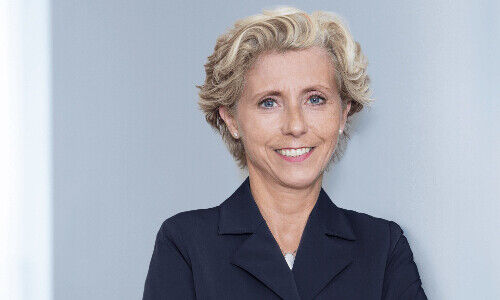Maria Albericci: «What’s Left When Bonuses Disappear?»
Leaving behind the comforts of a large Swiss bank was anything but easy. Even so, 15 years ago, she took the plunge into self-employment. Since then, her profession has changed dramatically, and the financial industry is a very different place. «The Swiss market alone is simply too small for 1,500 independent asset managers,» Maria Albericci tells finews.asia in an interview.
Maria Albericci, how hard was it to leave the security of a Swiss universal bank and, exactly 15 years ago, found an independent asset-management company?
Financially, the step was well prepared; I had set aside reserves. From the start, I thought the business model of independent client care on a bank platform was sensible and future-proof. Privately, we were already using independent brokers – for insurance, for instance – so the principle was familiar.
Harder was saying goodbye to a big bank’s perks: favorable mortgage terms, bonus payments, generous pension plans, sabbaticals, a reserved parking spot, or a professional back office. What remains when the bonuses vanish? Even little things disappear—the informal chat over lunch or the spontaneous coffee with the team.
«For many bankers, this adjustment is the biggest hurdle on the road to self-employment»
The toughest challenge, though, was the change in mindset: away from short-term thinking in transactions and commissions toward sustainable, performance-linked remuneration. That is still the biggest hurdle for many.
What gave you confidence that you would succeed?
My whole career, I was in direct contact with clients and knew investors’ needs well. From day one, we also had solid in-house expertise.
Very early, we built a rules-based, highly automated asset-management process – something that today is further reinforced by artificial intelligence. And we had first-class compliance know-how from the outset. So our early success did not surprise me.
What were the first bright spots and later milestones for Chefinvest?
Within months, we saw that many clients valued our independent perspective. Key milestones were early authorization by the regulator and the successful establishment of our rules-based investment process. Then came strategic partnerships with selected banks, continuous expansion of our digital infrastructure, and an uncompromising focus on transparency.
«The belt of fat has become much thinner»
Another major step was founding and licensing our subsidiary in Vaduz, Liechtenstein, in 2015. Today, it is central to our international business and proof of our sustainable growth strategy.
Were there moments when you were close to giving up?
«Look long and hard before you bind yourself forever…» In a partnership structure, you have to stand together in rough times, and that doesn’t work with everyone. You do ask yourself if it’s worth it. It would have been simpler to start only with my husband, Rico Albericci. But with our partner Patrick Huser we had a constant rock, and together we faced every challenge.
Today, we rely on a strengthened and enlarged partner team that contributes significantly to Chefinvest’s development. It has become a pillar of our business model – and an incentive to keep expanding that circle.
Over the past 15 years, what have been the biggest changes in Switzerland’s financial sector?
The «belt of fat» has grown much thinner. At the same time, genuine innovative spirit and a sense of new beginnings are still missing in many places. The relevant markets are largely divided up, and room for maneuver seems to be taken.
But a shift is looming with the upcoming generational change and altered geopolitical order. The Credit Suisse and UBS case was striking: it showed how crucial competent leadership at the executive committee level – especially on the board – is, and that this is above all a question of know-how, not gender. That insight motivated me to complete the HSG’s VR-CAS board-training program.
And the biggest surprises?
The Credit Suisse debacle. Switzerland’s second-largest bank was removed from the market with remarkable legal elegance – without anyone really being to blame, at least officially. And the public didn’t rally indignantly around its banks; people mostly shrugged. Apparently, affection for the domestic financial industry is no longer heartfelt.
Where do you stand today in terms of assets under management, staff, and profitability?
Today, it’s not just volume that counts but the quality of the assets, and that trend plays to our strengths. Transparency often means lower margins—something we have embraced from the beginning. We are profitable, growing sustainably, and becoming more competitive every day thanks to our model.
What must an independent asset manager offer today to stand out?
Quite simply: access to European clients. Many postponed or underestimated this strategic decision for too long; for some, it is probably already too late.
«The Swiss market alone is simply too small for 1,500 asset managers»
Solutions via Liechtenstein or Luxembourg are no longer a «nice-to-have» but a question of survival. The big banks feel neither pressure nor lobby interest to pursue them. Switzerland on its own is too small.
How do you rejuvenate your client base?
Not only clients but also ownership and leadership structures must move to the next generation. We often advise entire families – across generations and borders – so our client base naturally becomes younger.
What are your expansion and growth plans for the next two years?
We focus on organic growth but also examine targeted cooperations or mergers. Center stage is the further development of our digital infrastructure, especially AI. Clients today expect performance that not only matches but beats banks’ at a comparable cost. At the same time, the personal conversation remains indispensable.
«A partial relocation of UBS abroad is probably unavoidable»
We see ourselves as translators between artificial and natural intelligence—technologically leading yet human in scale.
Is Switzerland still attractive enough as a financial center for international wealth management?
Too administrative, not efficient enough. Separating the banking platform from client advisory would make sense to resolve conflicts of interest, but that would require regulatory adjustments and a clear division of roles.
Is UBS too big for Switzerland? Would it be bad if UBS moved abroad – both for Switzerland and for independent asset managers?
A partial move abroad is probably unavoidable. UBS still has the «S» in its name, yet only about 30 percent of its employees are in Switzerland, and the trend is downward. That would be a disadvantage for independent asset managers – and for Switzerland itself.
Maria Albericci is a founding partner of Chefinvest, based in Zurich and Vaduz, and serves as its chairwoman. She has spent more than 35 years in private banking. After training at St. Galler Kantonalbank, she joined Schweizerischer Bankverein (now UBS), then worked at Société Générale and Credit Suisse before returning to UBS, where she managed affluent private clients on Zurich’s Paradeplatz. In 2010, she became self-employed and has since advised wealthy clients from Switzerland and Austria. Within Chefinvest’s management, she is responsible for the CFO and HR areas. She holds the Swiss federal diploma as a certified financial planning expert.























